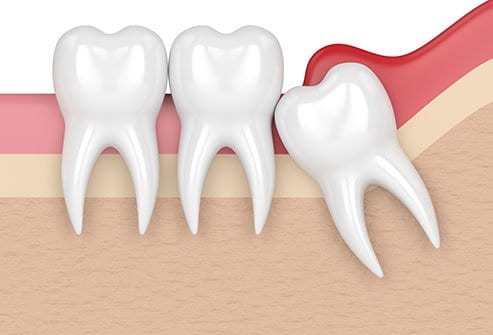
Wisdom teeth can be extremely uncomfortable and their presence in your mouth can actually put pressure on other teeth and cause problems with them. It definitely pays to get them looked at and handled as soon as possible before they become a problem. Having a good dentist is going to help.
- Can I Alleviate The Pain While I Wait?
There are a number of things that you can do to handle the pain that you experience while your wisdom teeth are either coming through or are causing you permanent pain.
Obviously, you can take over the counter medications such as Tylenol to alleviate the pain, and also handle the inflammation, but there are natural solutions as well.
Clove oil contains eugenol, which is a numbing agent – you can only use this for so long and then it may start to burn.
Saltwater will help cleanse and hold off bacterial infections, and this can be used once the tooth is removed as well. Garlic can have a similar effect, as can apple cider vinegar lightly diluted in warm water.
A moistened tea bag can be used to bite down on if your tooth has been extracted and won’t stop bleeding.
- What Does It Involve?
If you get emergency dental services on your tooth, what is actually going to happen? You may be worried because wisdom teeth can seem like a big deal compared to other dental issues.
If that tooth that needs to come out is considered a problem you are going to need a qualified oral surgeon or a general dentist.
You will have a local anesthesia applied, and you can choose to be knocked out if you want. It can be a little more involved extracting a wisdom tooth given their position in your mouth. You are going to have what is considered minor surgery, where tissue and bone around the tooth are removed so the tooth can be extracted, and you may need to have several stitches that will probably be dissolvable but may need to be extracted.
- What Is The Recovery Time?
You are going to have to plan for being in some discomfort for around 3 to 5 days after you have had the teeth extracted. They are going to bleed for about the first 24 hours, and there may be some stiffness in your jaw when the anesthesia wears off.
You are going to most likely be prescribed something like Tylenol to handle the pain, and you are going to have to eat soft foods for a while. You aren’t going to want to smoke or eat spicy foods either, because all of these things are going to be painful, and could slow down the healing process.
For your gums to heal totally you are looking at a bit longer – 3 to 4 weeks. It’s important to do what your dentist tells you to for looking after your gums and teeth after the operation or all of this would take longer to get better.
Conclusion
It is a fairly common procedure, having your wisdom teeth extracted. If you have any concerns you should consult with your dentist, but if you follow all the instructions the extraction and healing should be fairly straightforward.
